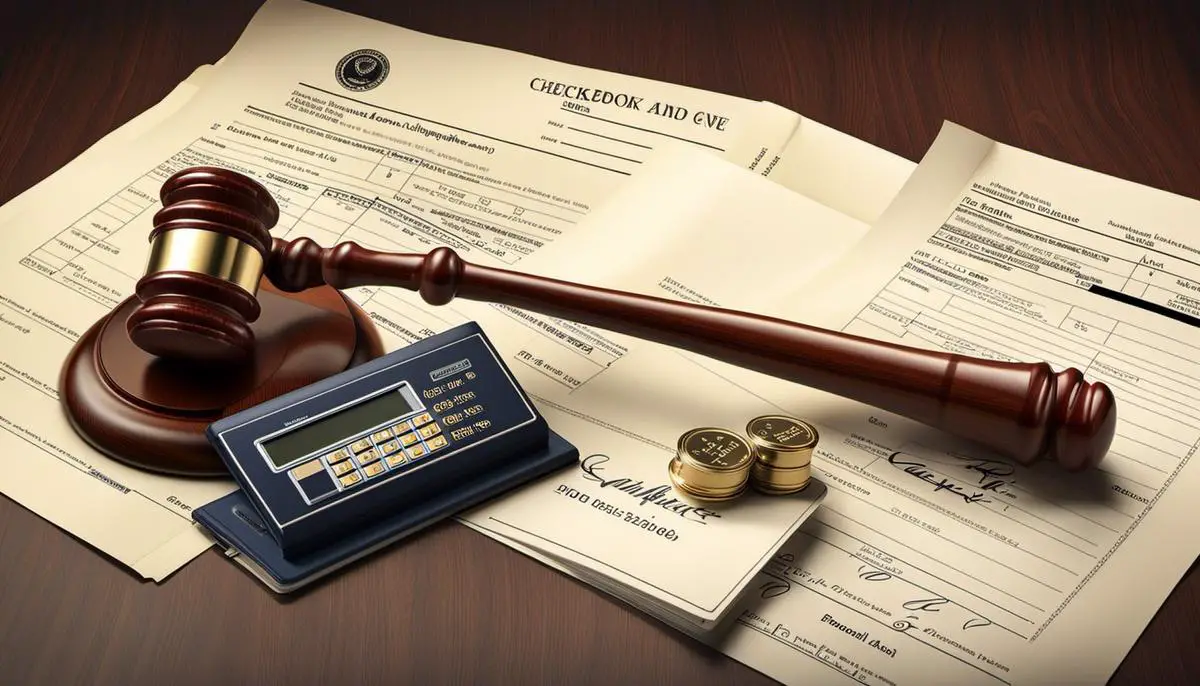In an age where digital transactions often eliminate the need for paper checks, there remains a sizable portion of the population who still rely on this traditional form of payment. It is for this reason that understanding the extensive check cashing laws that govern check cashing is relevant and essential.
My complete guide facilitates a grasp of both the federal and state-level regulations that remain in place for checks. Whether you are trying to cash payroll checks or you have a starter check, these legal requirements apply to both types.
This understanding can prevent severe repercussions such as legal trouble, credit damage, or even imprisonment. Moreover, it is crucial for businesses or individuals involved in check cashing transactions stay compliant and navigate this legal labyrinth effectively.
This understanding starts with exploring the key federal acts in place, down to specific state laws and their variations, then onward to the repercussions that come with violations. Lastly, we conclude with beneficial practices for compliant check cashing.
Federal Regulation on Check Cashing
Federal Regulation on Check Cashing: An Overview
Check cashing in the US is regulated at both federal and state levels. At the federal level, regulations aim to ensure transparency, security and fairness for all parties involved. Three pieces of legislation are particularly important for understanding check cashing laws: the Expedited Funds Availability Act, the Fair Credit Reporting Act, and the Bank Secrecy Act which includes anti-money laundering rules.
Expedited Funds Availability Act
Enacted in 1987, the Expedited Funds Availability Act (EFAA) regulates how quickly banks must make funds available to account holders from deposits made by check. According to EFAA, banks are required to provide same-day availability for cashier’s and certified checks, and next-day availability for federal, state, and local government checks. However, for regular checks, banks are allowed to hold the funds for a longer period to confirm that the check will not bounce.
Fair Credit Reporting Act
The Fair Credit Reporting Act (FCRA) plays a critical role in check cashing, especially when it comes to cash checking businesses. This federal law protects consumers’ personal financial information. Under FCRA, check cashing businesses are required to obtain consent before obtaining a consumer’s credit report. Such businesses are also prohibited from disclosing financial information to unauthorised third parties.
Bank Secrecy Act and Anti-Money Laundering Rules
The Bank Secrecy Act (BSA), enacted in 1970, is designed to aid government agencies in detecting and preventing money laundering activities. As part of the BSA, check cashing businesses must keep a record of all transactions exceeding $10,000. Furthermore, under the anti-money laundering rules, such businesses are mandated to report suspicious activities that might indicate criminal conduct, such as fraud or money laundering.
Understanding Legal Obligations for Check Cashing
It’s important for both businesses and individuals to understand their legal obligations when it comes to check cashing. For businesses, the law requires them to verify the identities of their customers, keep accurate records of transactions, report any suspicious activities, and adhere to the guidelines set by the EFAA and FCRA.
Individuals, on the other hand, are legally obligated to provide accurate information for their verification and to ensure the checks they bring for cashing are correctly filled and legitimate. Non-compliance to these standards can result in penalties, which might be as severe as fines or imprisonment.

State-level Check Cashing Laws
Ranging State Laws and Consumer Rights in Check Cashing
In the United States, the laws for check cashing vary across different states. Each state has its own regulations defining specifics like the maximum permissible fees that can be charged for cashing checks, the requirement of proper licenses by businesses to operate, and other measures to protect the interests of consumers.
Maximum Fees for Check Cashing
The allowable maximum fees for check cashing services vary widely by state. For example, in California, companies are allowed to charge 3% for personal checks and 5% for all other types of check. Meanwhile, Florida allows a maximum fee of 5% or $5, whichever is greater. In contrast, New York allows check cashing institutions a maximum fee of 2.03% for both personal and all other checks. States without specific laws in place typically follow the federal law, which does not set a maximum fee limit for check cashing.
It is not just banks that charge fees, the Walmart check cashing policy also has certain fees that they charge for check cashing at Walmart to customers.
Business Licensing and Consumer Protection
States also implement laws requiring check cashing businesses to acquire proper licensing before they can operate. These laws are meant to protect consumers and ensure that these businesses are held to certain standards. In California, for example, the law requires check cashing businesses to apply for a license through the Department of Business Oversight, while in Texas, the Finance Commission oversees the licensing process.
Consumer protection laws related to check cashing primarily aim to prevent fraudulent and high-fee practices. They include laws requiring the clear display of cashing fees, rules prohibiting cashing for certain types of checks, and regulations safeguarding against deceptive practices.
Notable State-Specific Legislation and Legal Decisions
Occasionally, substantial changes in check cashing laws come through notable state-specific legislation or legal decisions. For example, in 2017 a legal decision in New York placed stricter regulations on the check cashing industry. The New York State Department of Financial Services issued stricter oversight laws that increased audit frequencies and demanded more comprehensive financial and operational records from check cashing establishments.
State legislation can also influence the check cashing business landscape. In 2018, Pennsylvania passed a bill to increase the maximum allowable fee from 2% to 10% for government-issued checks. This not only impacted the residents who rely on check cashing services but also changed the potential profit for companies in this industry.
An Overview of Check Cashing Laws
Check cashing laws, while having some federal oversight, are largely governed by state legislation. These state laws can greatly vary in regard to consumer protection, licensing necessities, and maximum fee restrictions. It implies the importance for both residents and businesses to stay informed about the particular laws and potential legal decisions that govern check cashing in their respective states.

Photo by laughayette on Unsplash
Penalties and Consequences for Violating Check Cashing Laws
Consequences for Noncompliance with Check Cashing Laws
Failing to adhere to check cashing laws can result in serious repercussions, encompassing both civil and criminal penalties. Civil penalties might include monetary fines, potential closure of the business, or possible claims for up to three times the amount of an unlawfully cashed check or even up to $1,000 for each individual breach. There can also be demands for victim restitution, revocations of business licenses, and injunctions imposed to prohibit any further violations.
Criminal Consequences
Criminal penalties, on the other hand, can be much more severe. Offenders can face substantial fines, probation, or even imprisonment. The severity of the penalty is often determined by the amount of the check involved and the number of offenses committed. However, even first-time offenders can face imprisonment for check fraud, which is a felony in many jurisdictions. For repeat offenders, the penalties can be even more serious, and can often result in lengthy prison sentences.
Credit Damage and Legal Trouble
Beyond civil and criminal penalties, violating check cashing laws can result in significant damage to a person or business’s credit score. Once check fraud is reported, it will remain on the offender’s credit report for up to seven years. This can make it difficult for the person or business to get loans, credit cards, or even certain jobs.
Furthermore, legal trouble can follow the offender for years beyond their original violation. Future lenders, landlords, and employers may learn of the fraudulent activity when conducting background checks. This can lead to denials of credit, housing, and job opportunities.
Severe Cases and Imprisonment
In severe cases, such as those where large amounts of money were stolen through check fraud, offenders can face long-term imprisonment. According to federal law, check fraud involving amounts over $1,000 can result in a prison sentence of up to 30 years. Plus, those convicted of check fraud may also be ordered to pay restitution to their victims.
To conclude, it’s essential to follow check cashing laws closely. Failure to do so can lead to harsh consequences, such as hefty fines, possible imprisonment, damage to your credit score, and drawn-out legal battles. Therefore, it’s highly recommended for individuals as well as businesses to fully comply with these laws to prevent such negative outcomes.

Best Practices for Compliant Check Cashing
A Closer Look at Check Cashing Laws
First and foremost, it’s necessary to understand that the Uniform Commercial Code (UCC) governs check processing laws in the United States. These laws outline how financial institutions like banks manage check cashing, as well as the rights and responsibilities of the individuals involved in a check transaction. Alongside this, the Federal Reserve Bank’s Regulation CC (Reg CC) provides further stipulations for check clearance, depositing, and collection. Any breach of these regulations can lead to severe penalties for businesses, emphasizing the importance of remaining well-informed and compliant at all times.
Verifying Checks
One best practice for remaining compliant with check cashing laws is proper verification of the checks. Check verification typically involves confirming the identity of the person presenting the check, the account information on the check, and the check’s due date. Retailers and financial institutions may utilize third-party verification services, which assess the risk level of the check based on data from other financial institutions and retailers.
Documenting Transactions
Another critical part of maintaining compliance with check cashing laws is consistent and detailed documentation of all transactions. Every transaction must be recorded, including comprehensive information about the individual cashing the check. This information must align with the Federal Trade Commission’s ‘Red Flags Rule’, which mandates businesses to implement a written Identity Theft Prevention Program.
Reporting Suspicious Activity
Businesses and financial institutions are required by law to monitor transactions and report suspicious activities. The Bank Secrecy Act (BSA), for instance, requires businesses to report cash transactions that exceed $10,000 or appear to be ‘structured’ to avoid that threshold. Any activity that seems unusual, like frequent large deposits, should be reported in a Suspicious Activity Report (SAR).
Continuous Updates on Legal Changes
Finally, it’s important for people and businesses to stay abreast of any changes or updates to check cashing laws. This requires active engagement and sometimes seeking expertise from legal counsel. Websites of governing bodies such as the Consumer Financial Protection Bureau (CFPB) or the Financial Crimes Enforcement Network (FinCEN) provide valuable updates on a regular basis.
Training and Compliance Programs
To aid with all the above-stated best practices, many businesses participate in training and compliance programs. These programs not only educate about the current laws, but also propose internal controls and monitoring systems that can significantly hinder non-compliant activities. Such programs can be instrumental in helping businesses navigate the complex landscape of check cashing laws.

Comprehending check cashing laws is fundamental in preventing financial mishaps or legal infringements. Familiarity with the key laws at the federal level, such as the Expedited Funds Availability Act and the Fair Credit Reporting Act, alongside specific state laws and their unique requirements help ensure that transactions remain within the bounds of legality.
Furthermore, understanding the implications that transgressions carry, namely credit score damage, legal trouble or severe cases of incarceration, illustrates the gravity of compliance with these laws.
Nevertheless, safeguarding oneself or one’s business from these repercussions can be achieved by following best practices such as proper verification, documenting transactions meticulously, reporting suspicious activities and keeping abreast with any changes in legislations. Hence, navigation through the complexities of check cashing laws is made less daunting with a proper and continual understanding of their various aspects.



